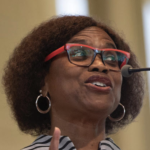
A year before the Mayflower arrived in 1620, the first group of enslaved Africans depicted as “20 and odd Negroes” arrived sometime during the final week of August to the Virginia colony of Jamestown. The fact that the exact date cannot be pinpointed assists in obfuscating the origins of slavery in the United States, but what is incontrovertible is the fact that this month marks the 400th anniversary of black bodies arriving at these shores against their will. Little could these “20 and odd Negroes” have fathomed millions more would come as huge cargoes of chattel slaves and not as human beings.
America keeps running away from this story, even as many Americans acknowledge slavery as the nation’s original sin. There are few accounts of an apology beyond the Southern Baptist Convention in 1995, former President Bill Clinton in 1998, the US House of Representatives in 2008 (H. RES. 194), and spiritual guru and presidential hopeful Marianne Williamson in 2018.
“On behalf of myself, and on behalf of my country, to you and all African Americans, from the beginning of our nation’s history, in honor of your ancestors and for the sake of your children, please hear this from my heart, I apologize, please forgive us,” Williamson told the audience during her “Love America Tour.”
One of the lingering impacts of 250 years of slavery followed by 90 years of Jim Crow and then 60 years of “separate but equal” is a seismic wealth gap between white and black Americans. It is estimated that approximately $12-14 trillion of unpaid black labor is owed for 400 years of economic inequality. Yet here in Greater Boston, which includes expensive Cambridge where I reside, for example, the median net worth for nonimmigrant blacks is $8, according to a 2015 study by Duke University, the New School, and the Federal Reserve Bank of Boston.
This year on Juneteenth (June 19, which commemorates the end of US slavery), the US House Committee on the Judiciary held a historic meeting on reparations, with economic initiatives discussed inside and outside the halls of Congress. Topics included remedies, consequences, and the disadvantages ensued as a result of the systematic disenfranchisement of African Americans.
These issues, of course, have been broached before and went nowhere—with civil rights activist James Forman in 1969 and also with former Michigan Rep. John Conyers Jr., who proposed a bill (H.R.40, in reference to the broken promise of “40 acres and a mule” to emancipated slaves) every year from 1989 until retirement in 2017. This session, Rep. Sheila Jackson Lee of Texas continued the legacy of sponsoring the Commission to Study and Develop Reparation Proposals for African-Americans Act.
If there are ever reparations in the form of monetary compensation for black farmland already confiscated or about to be seized by the government for back taxes, my spouse’s family would benefit. Her maternal side are Virginians from Upperville, a small unincorporated town known for horse breeding farms. They have been in Virginia since the 1600s, and with Ancestry.com may find their lineage points to one if not several of the “20 and odd Negroes” who first arrived.
My spouse’s Uncle Will died last year at the age of 102. He represents the second generation removed from slavery; my spouse’s mother is the last remaining sibling. Uncle Will’s grandmother, my spouse’s great-grandmother, was born into slavery and died as a free woman at the age of 108. Sometime during Reconstruction (1863-1877), the great-grandmother accrued a small plot of farmland that now awaits its fate, as her brood scrape together enough money to keep it.
By 1910, before Uncle Will’s mother gave birth to him on the family farm, black farmers operated approximately 213,000 farms, the height of black land ownership. However, soon after, black farmland was either forcefully taken by mob violence like the Klu Klux Klan, or gradually taken by state and federal governments through legal trickery or discriminatory lending practices. In 1916, the beginning of the Black Migration to northern cities, Uncle Will was born. When he grew up and wanted to go looking for a better life and wages, he left Upperville for Alexandria, and so, too, did his siblings, one by one, as they grew older.
Miraculously, the farm has stayed in the family despite the various machinations—legal and illegal—that government employees have fashioned to confiscate black farmland. The current outstanding back taxes are unattainable, though, especially with the deadline the state of Virginia gave the family to dispute or pay.
Reparations to African Americans are not a government handout. They are the “promissory note to which every American was to fall heir,” as Martin Luther King Jr. said in his “I Have A Dream” speech in 1963. “In a sense,” King said, “we have come to our nation’s capital to cash a check.”
Reparations are due to my spouse’s family as to millions more. America needs to pay up and pay forward.
Rev. Irene Monroe can be heard on the podcast and standing Boston Public Radio segment ALL REV’D UP on WGBH (89.7 FM). Monroe’s syndicated religion columns appear and the Boston voice for Detour’s African American Heritage Trail. She is a s a Visiting Researcher in the Religion and Conflict Transformation Program at Boston University School of Theology.

